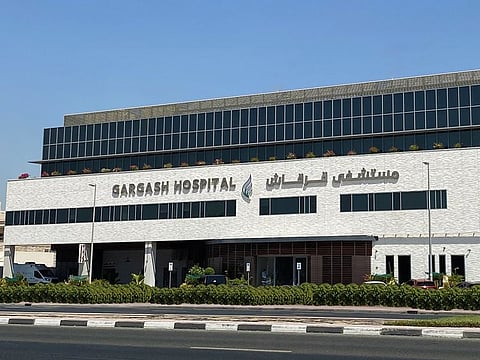Private sector to drive growth of Dubai's healthcare industry, says Gargash CEO
Adoption of latest technologies and strategic collaborations will help meet new demands

The private sector is set to play a crucial role in the growth of Dubai's dynamic and rapidly developing healthcare industry, says Ghada Sawalmah, CEO of Gargash Hospital.
“Since private hospitals are the primary investors, it is likely that the healthcare sector will experience growth driven by private hospitals in the future,” she explains. “We anticipate an increase in the number of private hospitals entering the market to take a share of the pie.”
According to current projections by the Dubai Healthcare City Authority, the UAE’s expenditure on healthcare is set to rise to Dh126 billion by 2027, with spending by the private sector growing at a projected CAGR of 8.8 per cent, compared to a CAGR of 7.5 per cent for the public sector.
Gargash Hospital is part of this burgeoning ecosystem of private hospitals, becoming the first female-owned and -led hospital in the country when it opened the doors just before the start of the COVID-19 pandemic. But Sawalmah’s understanding of the healthcare business stretches much further back – to her childhood, growing up as the daughter of two doctors, and watching her mother, Dr Husnia Gargash’s trailblazing journey as the country’s foremost fertility expert.
“I would often go to the clinics and hospitals where they worked since I was very young. I used to carefully watch my parents and their coworkers and how their actions affected the patients,” she recalls. “Being raised in a household of entrepreneurs allowed me to cultivate and enhance my business skills as well. I came to understand that my interest lay more in overseeing the business side of healthcare rather than practising as a doctor.”
The pandemic effect
That deep-seated knowledge helped Sawalmah steer the hospital through the difficult Covid years. “As a new hospital, we had to make numerous changes to our patient flow, employee management, and facility management,” she explains. “The pandemic proved to us that survival was a team sport, not only within the hospital but also within the healthcare community in Dubai. Sharing of knowledge, equipment, human resources, and PPEs was the need of the hour, and everyone stepped up to the task.”
We aim to establish ourselves as strategic allies and collaborate with other healthcare professionals to offer top-notch healthcare services to our patients

The remarkable response to the pandemic by the UAE is one of the key reasons for the projected growth in the private healthcare sector in the upcoming years, believes Sawalmah. “After the pandemic, there has been a rise in the number of people visiting the UAE, whether for tourism or employment purposes. A significant factor for this increase is the swift and effective management of the pandemic by the UAE government.”
According to government estimates, the population of Dubai is predicted to reach 5.8 million by 2040, and when it comes to medical tourism, the UAE and Dubai, in particular, tops the list as the number one destination in the region. In 2022, the emirate received a record 674,000 medical tourists from Asia, Europe and the Middle East and North Africa, who spent Dh992 million, an increase of Dh262 million from 2021.
“This indicates that a larger number of healthcare facilities will be needed to cater to the healthcare needs of the increasing population and medical visitors,” says Sawalmah. “There will be a rise in the use of new technologies and the creation of Centres of Excellence (CoE) to draw in medical tourists. The current players will either enhance their range of services or establish strategic collaborations to grow their patient base.”
Developing such strategic collaborations is the focus of Gargash Hospital’s own evolution in the near future, including major partnerships with the likes of Tarabichi Stammberger Day Surgical Center, Swift Day Surgical Center and BritishCare. “We aim to establish ourselves as strategic allies and collaborate with other healthcare professionals to offer top-notch healthcare services to our patients,” she says.
Digital healthcare
At the heart of all this development is, of course, technology. Driven by the learnings from the COVID-19 crisis, the UAE’s digital healthcare market is projected to grow from $1.06 billion (Dh3.67 billion) in 2022 to $4.42 billion by 2030, a CAGR of a whopping 19.6 per cent, according to recent industry estimates.
However, this rapid growth and assimilation of new technologies comes with a unique set of challenges for private healthcare providers, who need to juggle the costs of the technology with shifting government regulations.
“The most recent technologies demand significant financial investments for acquisition as well as implementation,” she says. “Another obstacle is combining the latest technology with the current healthcare information system (HIS), which may involve upgrading or modifying the existing HIS, resulting in additional expenses. The regulatory requirements for digital healthcare and new technologies are always changing.”
Sign up for the Daily Briefing
Get the latest news and updates straight to your inbox



